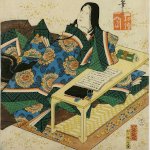Classics Day in Japan Date in the current year: November 1, 2026
 Classics Day (Koten no Hi) is observed in Japan on November 1 every year. It was created to celebrate the country’s rich cultural heritage and promote classical works.
Classics Day (Koten no Hi) is observed in Japan on November 1 every year. It was created to celebrate the country’s rich cultural heritage and promote classical works.Japanese culture has a very long history that can be traced back to the country’s prehistoric Jōmon period between circa 14,000 and 300 BC. Classical Japanese culture began to take shape during the Asuka period (538–710) and reached its peak during the Heian period (794–1185), when Chinese influence on Japanese culture and arts began to decline.
The Heian Imperial Court was known for its exquisite arts and vibrant culture. Major literary works of the Heian period include The Tale of Genji by Murasaki Shikibu, The Pillow Book by Sei Shōnagon, and the Tosa Nikki (Tosa Diary) and the poetry anthology Kokin Wakashū (Kokinshū), both associated with the court poet Ki no Tsurayuki. The Heian period also saw the development of the kana syllabaries.
Classics Day was originally declared by the Committee for the Thousandth Anniversary of The Tale of Genji in 2008. The Tale of Genji (Genji Monogatari) is a classic work of Japanese literature recounting the life of Hikaru Genji, the second son of a Japanese emperor who was removed from the line of succession for political reasons and lives an imperial officer. It was written by Murasaki Shikibu, a Heian-era noblewoman, poet, novelist, and lady-in-waiting.
The original manuscript of The Tale of Genji has been lost and its exact publication date is unclear, but the first recorded mention of the work is found in a November 1, 1008 entry in The Diary of Lady Murasaki. Murasaki briefly mentioned that Emperor Ichijō had the story read to him and that calligrapher had been selected from the court women to transcribe the manuscript. Based on this mention, the 1000th anniversary of The Tale of Genji was celebrated on November 1, 2008.
Although the inaugural Classics Day was celebrated in 2008, it took four more years to establish it officially: the Act on Classics Day was adopted in 2012. According to this law, “classics” that are honored on this day include not only literature, but also music, fine and applied arts, traditional performing arts, drama, entertainment, martial arts, lifestyle art such as ikebana (flower arrangement), calligraphy and tea ceremony, traditional clothing, achievements in the fields such as academia and philosophy, and more.
Classics Day also honors classical cultural products that originated in foreign countries but were adopted into Japanese culture or had a significant impact on it such as Kanshi (poetry written in Chinese that was popular among Japanese aristocrats during the early Heian period), the game of Go, classical music, Japanese translations of foreign literature, etc.
The celebration of Classics Day is coordinated by the Ministry of Education, Culture, Sports, Science and Technology. It kicks off the annual Education and Culture Week that also includes Culture Day, a public holiday celebrated on November 3 to promote Japanese culture, arts, and academic endeavors and accomplishments.
- Category
- Cultural Observances
- Country
- Japan
- Tags
- Classics Day in Japan, holidays in Japan, observances in Japan, cultural observances, classical Japanese culture